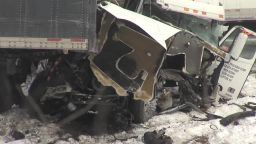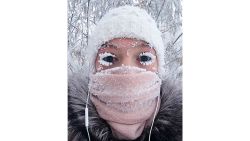Story highlights
NEW: Record-low temperatures are reported Sunday in some cities
NEW: Part of Interstate 65 in Indiana is closed after multiple crashes
NEW: Snow and freezing rain are impacting more than 75 million people into Tuesday
So much for a warm and fuzzy Valentine’s Day.
About 20 cities across the East endured record-breaking cold Sunday, forecasters say.
New York City’s temperature plummeted to 1 below zero at Central Park, shattering the record of 2 degrees, set during World War I.
Boston reported 9 below. Toronto’s temperature reached 16 below over the weekend.
And those are just the real temperatures.
Factor in strong winds, and states from northern Pennsylvania to Maine felt wind chills well, well below zero.
In all, more than 75 million people from the Midwest to the Eastern Seaboard are expected to be affected by snow and freezing rain into Tuesday.
New York City Mayor Bill de Blasio urged residents to brace for dangerous conditions.
“The city is facing some of the coldest temperatures and wind chills we’ve seen in the last 20 years,” de Blasio said. “Extremely cold weather can be life-threatening – especially for seniors, infants and people with medical conditions.”
The mayor thanked first responders.
“I think, the combination of the way New Yorkers have heeded the warnings, and the fact that our first responders are out constantly scanning for anyone who might need help, it’s been very effective. And thank God, we have no reports to date of any fatalities,” he said.
Parts of the South under the gun
Even the South isn’t immune to the frigid winter weather.
Another storm is expected to develop Monday in the Southeast and then move to the Northeast by Tuesday.
The heaviest snow will likely fall from Tennessee to the interior Northeast, meteorologists said, especially near the eastern Great Lakes and higher elevations of the Appalachians.
Winter storm coming? Be prepared
‘Wall of snow’
A cold air mass across the Great Lakes has spawned heavy lake-effect snow that is pushing inland, especially near Buffalo, New York.
Lake-effect snow happens when moisture from warmer lake waters mixes with cold air coming from the north, causing more than 2 to 3 inches of snow an hour.
“Depending on where you are, if you’re just south or north of this lake effect, it can look like a wall of snow is coming down,” CNN meteorologist Chad Myers said.
Deadly pileup

Intense snow and terrible visibility Saturday factored into a fatal pileup involving at least 60 vehicles near Fredericksburg, Pennsylvania.
At least three people died in the pileup on Interstate 78, Pennsylvania State Police said. More than 70 people were injured.
“It was definitely a whiteout. I couldn’t see any farther than probably two city blocks,” Raoul Jardine of Allentown said.
“I saw brake lights and pulled off to the side. Somebody hit me when I was parked in the shoulder.”
Parts of I-78 were still closed Sunday morning.
Elsewhere on Sunday, a part of Interstate 65 in Indiana was closed after an estimated 40 vehicles were involved in a series of crashes. Several injuries were reported, but none were thought to be life threatening.
“The roadways throughout Central Indiana are snow covered and hazardous. Only travel if necessary, reduce your speed significantly and allow ample space between you and the vehicle in front of you,” state police said in a statement.
Frostbite concerns
With the coldest weather of the season, the National Weather Service issued a warning about the symptoms and dangers of frostbite.
When frostbite strikes, ice crystals can form on the skin. Then the skin starts feeling warm, even though it hasn’t defrosted, the weather agency said.
After that, the skin can have a waxy appearance and turn red, pale or white, the NWS said. Finally, frostbitten skin can turn dark blue, black or gray, and cause pain that can last for hours.
Why milk, bread and toilet paper when it snows?
CNN’s Michael Guy, Joe Sutton, Taylor Ward, Anne Woolsey and Carma Hassan contributed to this report














